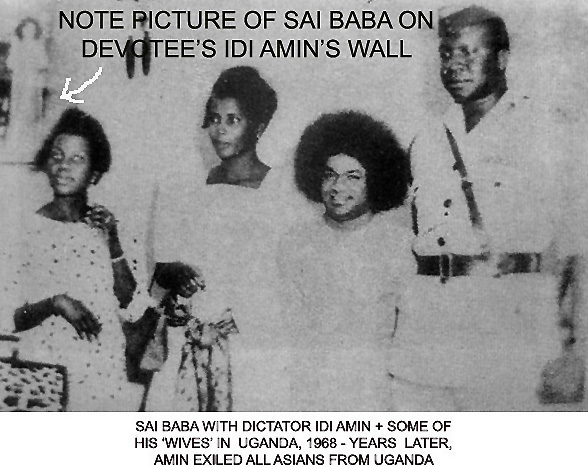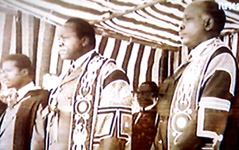"I consider myself the most powerful individual in the world" Idi Amin - alias 'The Last King of Scotland'

The occasion was the release of the feature film 'The Last King
of Scotland' with Forest Whitaker as gruesome dictaor Idi Amin. Sathya Sai Baba travelled to Kampala to meed Idi Amin - a keen devotee of his - on two occasions and spoke warmly about Amin, In a discourse he held on Christmas Day (25/12/2006)
he spoke most affirmatively about the brutal despot
and dictator (on Christmas Day of all days of the year!). Idi
Amin was a known and self-admitted murderer who had at least five wives
and 23 children (plus hundreds of 'lady friends'), who fed enemies to
crocodiles, reportedly kept some of his victims in his deep freezer,
and - according to persistent reports of his staff who escaped - even
tasted human flesh!Sathya Sai Baba's discourse was supported warmly by his main propagandist as head of Radio Sai and an official Sai Baba website, Dr. G. Venkataraman. It is in a discourse on Christmas Day 2007 (no less! click
here),
Sathya Sai Baba thereby lent himself to Idi Amin's extreme black supremacist
standpoint, travelling to Kampala in 1968 at the time
when he was becoming a powerful voice in Africa. Despite his own widely-reported sexual activities, Sathya Sai Baba famously demands chastity of all unmarried devotees (preferably even for married couples). Yet he tells 'unblushingly' how he was
introduced to and shook hands with two rows of Idi Amin's "wives", thus
condoning the polygamy and extreme profligacy of Idi Amin's! Both in word
and actions he favoured this monster of inhumanity, so what does that
say? Sai Baba need not have visited this monster of inhumanity Amin had he been so minded...
but he even accepted a dinner invitation from Amin and enthused about
it in his Xmas 2007 discourse.

Nyonga Rugumato Amundsen - the naturalised Norwegian daughter of Idi Amin's former foreign minister
in a TV inteview in Oslo with Norway's P. M. Jens Stoltenberg on right.


 <
<Center: Amin's ex-Foreign Minister Mr. Nyonga Rugumato (l.) with Amin (r.) + Univ. Vice Chancellor (r. close)
English translation of the TV interview: N.R. Amundsen: Yes, that's right. Interviewer: And you live several of your childhood years in Idi Amin's Uganda, until you fled the country. You saw this film today [Editor .note: 'The Last King of Scotland'] . Was that Idi Amin in your opinion? N.R.Amundsen: Yeeees.. in part. It was his personality - also the way he changes his mind and invents things - gets impulses - that is quite like him. But unfortunately we did not see how really charismatic he was - that is, in the film - because we see only where he was most brutal - one does not understand why people liked him... what it was that made people in Uganda like him. Interviewer: What kind of charisma was that? N.R.A: He could talk, was amusing and polite and quite unbelievable - and he always referred to God. He said "I dreamed and God came to me in a dream and said that I had to extradite asians" for example, if he wanted to say anything. He was very dramatic. |
Norwegian
transcript of the TV interview: NR Amundsen: Ja, det stemmer. Intevjuer: Og du levde flere av dine barneår i Idi Amins Uganda inntil dere flyktet. Idag var du og så denne filmen. Hva dette Idi Amin for deg? N.R.A: Jaaaa... tildels. Det var også hans personlighet - også måten han ombestemmer seg eller finner på ting - får innfall - det ER ganske likt han. Men dessverre så få vi ikke sett hvor egentlig karismatisk han var, da, i filmen, fordi vi kan bare ser den delen hvor han var mest brutal man skjønner ikke hvorfor folk likte han... hva (det) det som gjorde at folk i Uganda likte Amin. Intervjuer: Hva slags type karisma var det?' N.R.A: Han kunne snakke, han var morsom og høflig og helt utrolig - og alltid refererte til Gud. Han sa "jeg drømte og Gud kom til meg i en drøm (og) sa at jeg måtte utvise asiater... for eksempel, hvis han hadde lyst å si noe. Han var veldig dramatisk. |
Note: Sathya Sai Baba has often stated in his published discourses that no one can dream about him without his willing it. Hundreds have reported numerous dreams of Sai Baba in which they believe he visited and even instructed them, which he has often confirmed in interviews. (I also formerly dreamt of him hundreds of times). However, after five decades of affirming this, he typical contradicted himself by completely denying in a public discourse in 2004 that any dreams originate from him, that they all only come from oneself.
English translation of the TV interviewcontinued N.R.A: Well, he actually first got to know via the radio that he was made a minister. So he was not invited to a meeting to talk about it, just got to know that Edward Rugmayo is named as minister. Interviewer: Oh yes. And he didn't know Amin before that, or what? N.R.A: No. (audience laughter) Interviewer: But did one believe at that time - including your father - that Amin could be a good man? N.R.A: Yeees... because at that time he was so convincing and charming, seemed to be serious. So, like all the others at the time, he believed maybe he was better than Obote. Interviewer: When he - your father - got that job and you lived in Uganda as a minister's family, how did you live.. was it a life of luxury? N.R.A: It was a pleasant, comfortable and protected life then. We had bodyguards and chauffeurs, cooks and gardeners - it was a very protected life. You did not see much of others - how they lived - apart from one's own circle. Interviewer: You remember some meeting yourself with Idi Amin, how would you describe the experience? N.R.A: He had a
deep voice and such big hands, they reminded me of bananas - I was
9 years old then. I was then a flower girl in the wedding of the Foreign
Minister and so had to shake hands with him. He was so huge. N.R.A: There were so many things then. Sometimes sudden
whims like 'now we shall extradite Asians, now we shall do this or
that. And suddenly civil servants began to disappear - very well known
people - eg. the Vice Chancellor of the University disappeared. N.R.A: He was murdered, he was purely and simply fetched by Idi Amin's murder squadron. No one saw him again. He disappeared. Interviewer: Did anything happen among those closest to you? N.R.A: Yes. My uncle was actually killed by Idi Amin. And all that was found of him was a hand, so his wife recognised the ring. The rest of him was gone. Interviewer: You decided to flee. N.R.A: It was quite dramatic. One evening my father came home and said to us "Yes, children, just pack a case each, we are travelling away for a short while to Nairobi." We thought, Oh, such fun. It sounded like fun. But we didn't know that we would never come back to the house, we never got to say 'Good bye' to our friends. We just disappeared one night. We took a plane. Interviewer: But didn't they follow after you? N.R.A: No, not just then. But when we were in Nairobi, we had to seek the protection of the Kenyan government. And from Nairobi, my father went to Mombasa and from there he sent a telex to Idi Amin via the post office so that all who read it could see where he said that he did not want to be in the government. Idi Amin was shocked, and he reacted by sending all the ministers on an indefinite holiday. Interviewer: That is so to speak typical of the way he reacted. N.R.A: And all the State Secretaries became State Ministers thereafter! Interviewer: That would not have worked here, Stoltenberg?
(laughter) Interviewer: I think perhaps both you and I grew up with Amin as a picture from our youth of a real dictator, a proper baddie? Prime Minister Stoltenberg: Yes, there have been many dictators and many despots, but Amin was such a strong personality and I think he was so visible and did so many provocative things that he became that era's picture of a despot. I am still of the opinion that all he did was very illegal, but that makes the whole matter extra bad is that he was never convicted. I think we must have a world society which convicts that kind of criminal... and now we have got an international court which hopefully will judge that kind of person. He left Uganda and lived - whether he lived happily I don't know - but he at least was never brought to book for his misdeeds. Interviewer: Are people in Uganda - or from Uganda - upset that he never got his comeuppance? N.R.A: Yes. Many people are. Yes. Particularly those who lost their dear ones. We felt that Amin got away too lightly, he fled to Saudi Arabia and lived in Jeddah in style in a villa with 27 rooms and was happy... perhaps. Interviewer: Many thanks for coming and telling us this! (Much applause). |
Norwegian
transcript of the TV interview continued: Intervjuer: Men, først, hvordan ble din far hans minister? N.R.A: Vel, han fikk faktisk vite on dette via radio at han var blitt statsråd. Så han ikke ble invitert til møte for å snakke om dette, han bare fikk vite at Edward Rugmayo er utnevnt som statsråd. Intervjuer: Og ja. Så han kjente ikke Amin før, eller? N.R.A: Nei. (latter i salen) Intervjuer: Men, trodde man på den tiden - også din far - at Amin kunne være en bra mann? N.R.A: Jaaa... fordi på den tiden
var han så overbevisende og sjamerende, virket som han mente
alvor. Så han trodde som alle andre på den tiden at han
var kanskje bedre en Obote alltså. Intervjuer: Du husker jo selv noen møter med Idi Amin, hvordan kan du beskrive den opplevelse? N.R.A: Han hadde
dyp stemme og noen store hender som minnet meg om bananer - jeg var
9 år gammel da. Jeg var blomsterpike i en bryllup da utenriksminister
giftet seg og så måtte hilse på han da. Han var
så svær. N.R.A: Det var så mange ting da. Noen ganger plutselige utfall 'nå skal vi utvise asiater', nå skal vi finne på ditten og datten. Og plutselig begynnte embetsmenn å forsvinne da - ganske kjente folk - f.eks. Vise-Rektor på Universitetet forsvant. Intervjuer: Vi har et bilde her du tok med som viser Idi Amin i midten, din far til venstre for og den Vise-Rektoren naermest. Og hva skjedde med ham? N.R.A: Han ble myrdret, han ble rett og slett hentet av Idi Amins morderskvadron. Ingen så ham igjen. Han forsvant. Intervjuer: Dere oppdaget noen dødslister, gjorde dere ikke det? N.R.A: Ulike mennersker begynnte å forsvinne. Bl. a. landbruksministeren forsvant. Han ble hentet en kveld. Han bodde to hus far oss, da. Kom aldrig tilbake. Kom aldrig tilbake, ble hentet av Amins folk. Intervjuer: Skjedde det noe blant dine nærmeste? N.R.A: Ja.
Min onkel faktisk ble drept av Idi Amin. Og det eneste som ble funnet
av han var en hånd, så kona hans gjenkjente ringen. Resten
av ham var borte. N.R.A: Det var ganske dramatisk. En kveld kom faren min hjem og sa til oss "Ja, unger, bare pakk en koffert hver, vi skal reise bort en liten stund til Nairobi." Vi tenkte, ah så morsomt o.k. Det hørtes gøy ut. Men vi visste ikke at vi kom aldri tilbake til huset, vi fikk aldri sagt 'ha det' til vennene våre. Vi bare forsvant en kveld. Vi tok fly. Intervjuer: Men de kom ikke etter dere? N.R.A: Nei, ikke
akkurat da. Men når vi var i Nairobi, måtte vi søke
beskyttelse av den Kenyanske regjering. Og fra Nairobi dro faren min
til Mombasa og det var da han sendt teleks til Idi Amin, via postkontoret
slik at alle som leste det kunne se dette her hvor han sa at han ikke
vil være i regjeringen. Idi Amin ble sjokkert, og han reagerte
ved å sende all statsrådene på ubestemt N.R.A: Og alle statssekretærer blir statsråder heretter! Intervjuer: Den hadde ikke gått her, Stoltenberg? (latter) Statsminister Stoltenberg: Nei. Det hadde ikke gått. Foruten har vi dobbelt så mange statssekretærer som statsråder, så det hadde blitt altfor mange i regjeringen. (latter). Intervjuer: Jeg tror kanskje både du og jeg vokste opp med Amin som et bilde fra ungdommen til en skikkelig diktator, en ordentlig versting? Statsministeren: Ja, det er vært mange diktatorer og mange despoter, men Amin var en så sterk personlighet og jeg tror han var så synlig og gjorde så mange provoserende ting så han ble den tidens bilde på en despot. Det jeg fortsatt mener at alt han gjorde var veldig illegalt men det som måtte gjøre det hele ekstra ille var at han aldri ble dømt. Jeg mener man må ha en verdenssamfunn som dømmer det type forbrytere... og nå har vi fått en internasjonal domstol som forhåpentligvis vil dømme den type mennesker. Han forlot til sist Uganda og levde - om han levde lykkelig vet jeg ikke - men han i alle fal sto aldri til rette for sine ugjerninger. Intervjuer: Er dette noe mennesker i Uganda eller fra Uganda plages av - at han aldri fikk sin? N.R.A: Ja. Mange mennesker gjør det. Ja. Særlig de som har mistet sine kjære. Vi følte at Amin slapp litt for lett fra det, han rømte til Saudi Arabia og bodde i Jeddah i sus og dus i villa med 27 rom og var lykkelig... kanskje. Intervjuer: Tusen takk for at du kom og fortalte oss! (Stor applaus) |